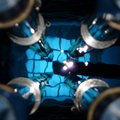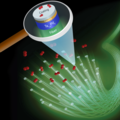News
14 April 2022
Dutch Research Council Veni grant for Robin de Kruijff

The Dutch Research Council (NWO) has awarded a Veni grant to researcher Robin de Kruijff of the Reactor Institute Delft (RID) for her research on a new type of radionuclide generator which, among other things, can obviate the global bottleneck in cancer research. The new generator will, moreover, be the first recyclable one of its kind. “I hope that my new type of generator will ultimately make diagnostic treatments much more accessible and less dependent on a handful of reactors”, says De Kruijff.
17 March 2022
How fuels work in the next generation of reactors

Recently an important project on fuels for future generation of reactors has been concluded. The aim of the INSPYRE project: investigation of fast reactor Mixed Oxide (MOX) fuel to support the development and qualification of the fuels for the future generation of reactors.
10 March 2022
The Battolyser: battery and hydrogen factory in one

Currently, storage is the key issue holding back the energy transition. Professor Fokko Mulder and CEO Mattijs Slee from Battolyser Systems are within reach of the solution: the Battolyser is a battery and a hydrogen factory in one. The TU Delft spin-off is a textbook example of how to create impact from research.
24 January 2022
TU Delft's Reactor Institute takes another step forward as a testing ground for innovation

The Reactor Institute Delft (RID) continuously invests in better measuring methods and techniques in order to facilitate pioneering research. We have accelerated this with the OYSTER (Optimised Yield - for Science, Technology & Education - of Radiation) programme.
25 October 2021
TU Delft spin-off MILabs acquired by Rigaku Corporation

MILabs, a TU Delft spin-off that develops ground breaking imaging devices, is acquired by Rigaku Corporation. Founded in 2006, MILabs provides pre-clinical imaging systems and equipment with higher efficiency and accuracy than conventional alternatives. MILabs has developed a unique system that enables high performance nuclear medicine imaging. The innovative technique contributes to the quest for new therapies and new insights into disease biology in research labs around the world.
01 October 2021
Safety and modernisation go hand in hand at Reactor Institute Delft (RID)

In September, Reactor Institute Delft (RID) was visited by an INSARR mission (Integrated Safety Assessment for Research Reactors) from the International Atomic Energy Agency (IAEA). In its report, the team of experts from the IAEA concluded that during a significant modernisation operation of the research reactor, safety was prioritised. The team also found areas requiring further enhancements, including the organisational structure and safety procedures and documentation.
17 May 2021
New research shows: Antoni van Leeuwenhoek led rivals astray

A microscope used by Antoni van Leeuwenhoek to conduct pioneering research contains a surprisingly ordinary lens, as new research by Rijksmuseum Boerhaave Leiden and TU Delft shows. It is a remarkable finding, because Van Leeuwenhoek (1632-1723) led other scientists to believe that his instruments were exceptional. Consequently, there has been speculation about his method for making lenses for more than three centuries. The results of this study were published in Science Advances on May 14.
20 April 2021
Dome plating RID
RID's dome is getting a makeover, in the form of new dome plating. How are things going with this cosmetic operation? Project leader Simone Janssen gives us an update in this video. Don't forget to enable the subtitles!
02 March 2021
Delft researchers develop a versatile hydrogen sensor

Hydrogen is playing an increasingly important role in the transition to a completely sustainable economy. Right now it is already being used on a large scale in industry, but it is also being used more often for sustainable energy storage and as a fuel for large and heavy vehicles in particular. There are plans for converting the existing natural gas network into a hydrogen network. However, under certain circumstances hydrogen is a combustible and sometimes even an explosive gas, so it is important to track down the tiniest hydrogen leaks as quickly as possible. This makes cheap, reliable and small sensors that can quickly detect small amounts of hydrogen of vital importance. Researchers at TU Delft have now developed a material that is extremely suited to this task.
11 February 2021
Reactor Institute Delft re-appointed as official partner of International Atomic Energy Agency

The Reactor Institute Delft (RID), the nuclear research reactor at TU Delft, has been selected as a Collaborating Centre of the International Atomic Energy Agency (IAEA) for the fourth time. The IAEA and RID have agreed to expand their area of cooperation in Neutron Activation Analysis (NAA) to neutron beam-based methodologies – a key technique in materials research, biology and medicine.